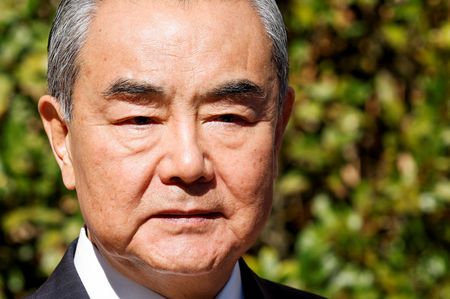MANILA (Reuters) -The Philippines accused China on Tuesday of intimidating its fishermen at a disputed South China Sea shoal, and normalising an “illegal presence”, after Beijing sent its largest coast guard vessel into Manila’s maritime zone.
The move comes against the backdrop of rising tension between the Philippines, a U.S. treaty ally, and Beijing during the past two years, stemming from their overlapping claims in the busy waterway of the South China Sea.
The Philippines has protested this month against the entry of Chinese vessels in its 200-nautical-mile exclusive economic zone (EEZ), including the 165-m (541-ft) -long ship 5901, last spotted 77 nautical miles off the western province of Zambales.
Jonathan Malaya, a spokesperson for the Philippines’ National Security Council, reiterated a call for Beijing to withdraw from Manila’s waters the “monster ship” he said was deployed to intimidate its fishermen around Scarborough Shoal.
“We were surprised about the increasing aggression being showed by the People’s Republic of China in deploying the monster ship,” Malaya told a press conference.
“It is an escalation and provocative,” Malaya added, calling the presence of the vessel “illegal” and “unacceptable”.
“It is also a clear attempt to intimidate our fishermen and deprive them of their legitimate livelihood.”
China’s embassy in Manila said the shoal, which it calls “Huangyan Dao”, is China’s territory, and its actions are in “full accordance with the law”.
“It is fully justified,” the embassy said in a statement.
Since China seized the Scarborough Shoal in 2012 after a standoff with the Philippines, its coast guard ships have maintained a constant presence to patrol the area.
But China’s recent actions have become more concerning because its coast guard vessels moved closer to the Philippine coast, Malaya added.
The Philippine coast guard said it had sent two of its largest vessels to drive away the ship whose presence, its spokesperson said, aimed to normalise China’s “illegal deployment” of coast guard vessels in Manila’s EEZ.
China’s expansive claims in the South China Sea, a strategic shipping conduit for about $3 trillion of annual commerce, overlap with the EEZs of Brunei, Indonesia, Malaysia, the Philippines and Vietnam.
In 2016, an international tribunal ruled China’s claims to large swathes of the disputed waterway had no basis, a decision Beijing rejects.
(Reporting by Mikhail Flores and Karen Lema; Editing by John Mair and Clarence Fernandez)









